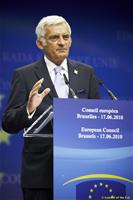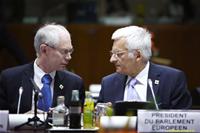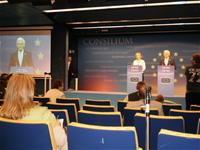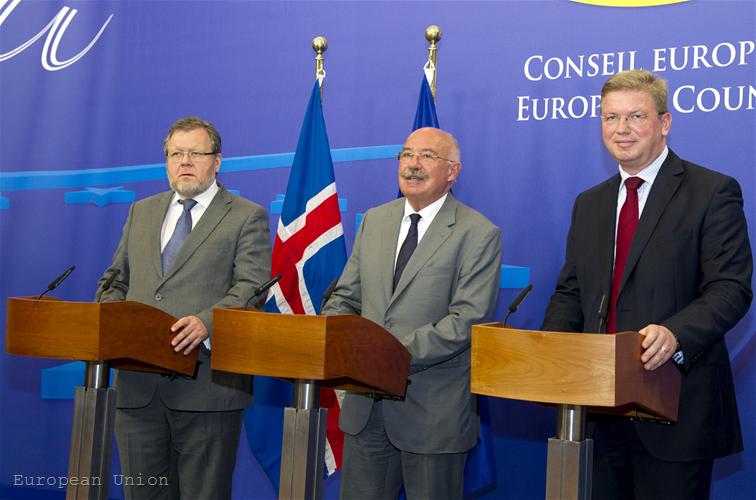The European Parliament wants a key role in EU governance
Ralitsa Kovacheva, June 22, 2010
 The President of the European Parliament Jerzy Buzek was the first politician who met the media during the European Council last Thursday. Buzek defined the Council as “fundamental”, because its is on its decisions the future generations will depend life on. The President did not conceal the discontent of the European Parliament, which he had expressed also in front of EU leaders, that the Council and the Commission had not consulted the Parliament on some important issues. Obviously, this was the reason why the President of the European Parliament took part in the Council and perhaps the reason why his briefing was delayed by an hour-an hour and a half.
The President of the European Parliament Jerzy Buzek was the first politician who met the media during the European Council last Thursday. Buzek defined the Council as “fundamental”, because its is on its decisions the future generations will depend life on. The President did not conceal the discontent of the European Parliament, which he had expressed also in front of EU leaders, that the Council and the Commission had not consulted the Parliament on some important issues. Obviously, this was the reason why the President of the European Parliament took part in the Council and perhaps the reason why his briefing was delayed by an hour-an hour and a half.
The European Parliament had not been consulted and had not been even informed on the decision, taken by the Council and the Commission, to create the Special Purpose Vehicle, Buzek said. “I understand it was an urgent situation, an overwhelm. We know in the European Parliament that proper decision was taken but in any time we should be consulted, because the basis is the Lisbon treaty”, he noted.
Buzek expressed very clearly and firmly his position against the creation of separate economic governance of the euro area. “We don't need new institutions, we should use the institutions, which are working in the European Union and to strengthen them”, he said. And he explained, that the coordination of the economic union should be conducted by the European Commission, should be based on the Stability and Growth Pact and should be applied by all 27 Member States. This is very important, because the problems with the euro also affect the other European currencies, Buzek said. This view was supported by a special resolution of the Parliament on the economic governance, approved on the eve of the Council:
“The new economic governance model must have the Commission at its centre  and should be based on a carrot and stick approach, rewarding good performance and penalising recalcitrant Member States, says Parliament. To gain the required legitimacy, this model must be built through a closer involvement of the European Parliament and national parliaments.”
and should be based on a carrot and stick approach, rewarding good performance and penalising recalcitrant Member States, says Parliament. To gain the required legitimacy, this model must be built through a closer involvement of the European Parliament and national parliaments.”
In their resolution MEPs call for the creation of a "European Monetary Fund" (EMF) (an idea, strongly pushed by Germany a few months ago) to which eurozone countries would contribute in a manner proportionate to the size of their GDP and through fines determined on the basis of their excessive debt and deficit levels. Any Member State would be able to draw EMF funds up to the amount it had deposited previously. However, should a country need additional resources or guarantees, it would have to accept a tailor-made reform programme, the implementation of which the Commission would supervise.
According to the MEPs, it is very important the community method to be applied, rather than focusing on intergovernmental cooperation, as it is now. Thus, budgetary coordination is crucial, the Parliament states and recommends Member States to focus their economic and budgetary programs on common European goals, not only on their national interest. In this sense was also the statement of Jerzy Buzek: "We have to do the right thing and not just the convenient thing.”
President Buzek once again expressed the position of the European Parliament, that Europe 2020 strategy is not ambitious enough. On the eve of the Council the MEPs voted on a special resolution, according to which Europe 2020 strategy should have more concrete and binding targets, especially in terms of education and poverty. These should include a 3% of GDP target for R&D spending, binding goals for greenhouse gas emissions reductions and a 50% reduction in poverty in the EU. With regard to education, the Parliament urges the Council to set a 100% target for secondary education, school drop-out rates below 10% and at least 40% of the population to have tertiary or equivalent education;
MEPs warn, that implementing the strategy requires more stringent rules to replace the open method of coordination, applied now. They criticize Member States of lack of ambition and urge the Commission to provide Parliament with more detailed plans for the implementation of initiatives under the strategy. On spending, MEPs raise alarm that the "flagship" programmes of the EU2020 strategy do not have sufficient funding envisaged in the draft 2011 budget and suggest options for a review.
 In his statement to the leaders, Jerzy Buzek had expressed hope that the final targets of the strategy would not be adopted without consulting the European Parliament. And, in order to be absolutely clear: ”The Treaty of Lisbon has made my institution, the European Parliament, a full co-legislator in our law-making system. We want and expect to play a key role in the next stage of European integration.”
In his statement to the leaders, Jerzy Buzek had expressed hope that the final targets of the strategy would not be adopted without consulting the European Parliament. And, in order to be absolutely clear: ”The Treaty of Lisbon has made my institution, the European Parliament, a full co-legislator in our law-making system. We want and expect to play a key role in the next stage of European integration.”
 | © European Union
| © European Union | © Larus Karl Ingason
| © Larus Karl Ingason | © euinside
| © euinside